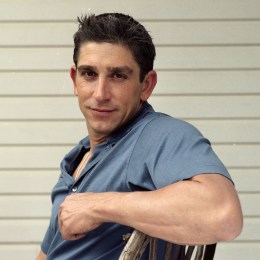
The title poem of Richard Blanco’s 2012 book of poetry, Looking for the Gulf Motel, is a poignantly evocative work about the memory of family. But its refrain — “There should be nothing here I don’t remember” — suggests more than Blanco probably intended now that he has been invited to read his verse at President Obama’s Inauguration next week. The gay Cuban-American immigrant’s sudden but well-deserved elevation to the national stage is a healthy reminder that demographically, America today is no longer the country we remember. And that’s the very symbolism Obama wants to convey given the 21st-century coalition that re-elected him.
But it’s also indicative of how much the Cuban community in the U.S. has changed — and how much more it may change now that the communist government in Cuba, as of this week, is letting Cubans on the island travel abroad freely for the first time in more than half a century. Both Blanco’s ascent to Maya Angelou status on this side of the Florida Straits and the Castro regime’s relaxation of its harsh travel restrictions on the opposite side — even, it appears, for dissidents — contradict each side’s image of the other. That might eventually help U.S.-Cuba relations move out of their Cold War mire and closer to the 21st century. It’s a big might, but consider nonetheless:
Blanco, 44, is not your father’s Cuban exile. He was conceived in Cuba, born in Spain after his parents bolted Fidel Castro’s revolution and brought to Miami as an infant. But while his work certainly pays homage to his family’s immigrant trials and triumphs, it views the more conservative, hard-line exile cohort of his parents’ generation — the diehards who brought us the 2000 Elián González fiasco, which caused so much Cuban-American soul-searching — with a skeptical eye. His poem “América,” a reminiscence about the anxieties of a 1970s Cuban-American Thanksgiving (roast pork or turkey?), takes a momentary but sobering detour at “… Antonio’s Mercado on the corner of 8th street/ where men in guayaberas stood in senate/ blaming Kennedy for everything — ‘Ese hijo de puta!’/ the bile of Cuban coffee and cigar residue/ filling the creases of their wrinkled lips/ clinging to one another’s lies of lost wealth/ ashamed and empty as hollow trees.”
At least on Inauguration Day, Blanco will rival the more conservative likes of Florida Senator Marco Rubio as the new face of Cuban Americans — which would also reflect exit polls that showed Obama winning almost half of Florida’s Cuban vote in the November election, unprecedented for a Democrat. All of that belies Havana’s insistence that every Cuban American is hell-bent on invading the Bay of Pigs again, an air-raid siren the Castro dictatorship uses to keep a firm grip on power. If more Cubans visit the U.S. now under the liberalized travel rules, they’ll see for themselves that most Cuban Americans, and most of the rest of America, aren’t the rabid imperialist fascists Havana tells them we are, and they’ll take that realization back to Cuba’s streets, homes and offices.
They’ll also notice that gay citizens like Blanco are no longer social pariahs in American or even Cuban-American society — or that at least they’re not demonized the way they were in 20th century Cuba. In recent years, gay rights have improved on the island thanks in large part to Fidel’s niece, Mariela Castro Espín, the daughter of Fidel’s younger brother and current Cuban President, Raúl Castro, who has worked to convince Havana that macho gay bashing isn’t exactly the smartest calling card for a left-wing government.
But the Cuban visitors may well have their own effect on the U.S. No one is claiming a Cuban Spring right now — basic democratic rights are still suppressed on the island — but Raúl Castro’s recent reforms, from lifting the travel restrictions to permitting Cubans to buy and sell private property, stand to challenge U.S. assumptions. If Havana really is willing to let even dissidents travel out of and back into Cuba, it displaces our half-century-long picture of desperate Cubans risking their lives to escape across the sea on rafts. The prominent dissident blogger Yoani Sánchez tweeted this week that officials in Cuba told her that she could travel — though she added understandably that she’ll believe it when she’s actually on a plane out, and then on one back in again.
The more hard-line Cuban-American caucus on Capitol Hill is unsettled at the changes, especially now that a Cuban-American Democrat, Joe Garcia, who is more moderate on Cuba policy, just got elected to Congress from Miami. This week, in fact, caucus leaders like Republican Congresswoman Ileana Ros-Lehtinen of Miami expressed fears that if Cubans begin traveling between Cuba and the U.S. like any other foreign tourists, it could render all the special U.S. immigration provisions for Cubans unnecessary. Their bigger worry is that this sort of cross-Straits normalization will strengthen the belief held by most Cuban Americans, according to polls, that the U.S. should drop its failed, 51-year-old trade embargo against Cuba.
But that kind of change is likely a long way off, especially since disputes over matters like Cuba’s imprisonment of U.S. aid worker Alan Gross, for what Havana calls espionage, are blocking real dialogue right now. In the meantime, there’s Blanco’s superb poetry:
“… my father should still be alive, slow dancing/ with my mother on the sliding glass balcony/ of the Gulf Motel. No music, only the waves/ keeping time, a song only their minds hear/ ten-thousand nights back to their life in Cuba.”

